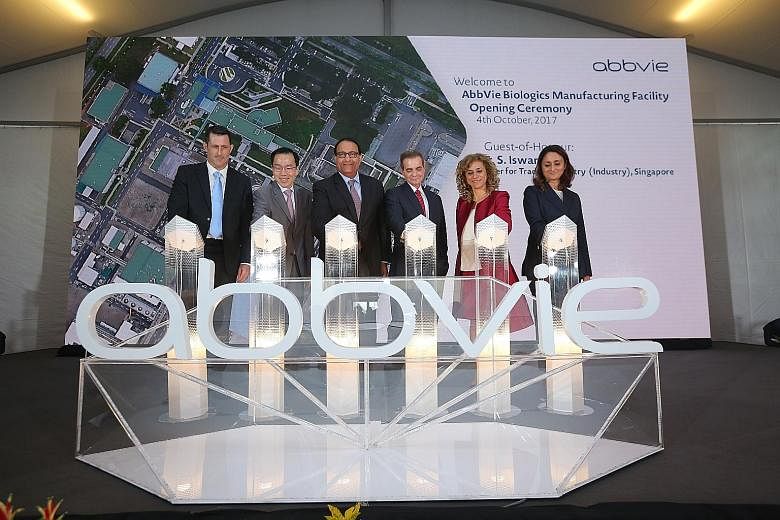More than 350 people have benefited from the Professional Conversion Programmes (PCPs) for the pharmaceuticals and biologics sectors since their launch in 2014, said Minister of Trade and Industry (Industry) S. Iswaran.
The PCPs, jointly developed by Workforce Singapore (WSG) and Singapore Economic Development Board (EDB), help mid-career professionals to reskill and acquire the knowledge and competencies to take on jobs in different or adjacent sectors.
Mr Iswaran cited the case of 37-year-old Ong Shin Ran, a PCP participant undergoing training as a bio-technologist with drug-maker AbbVie. Mr Ong previously worked as a manager in the marine and offshore industry for six years.
"The PCP's comprehensive curriculum and structured on-the-job training will equip Shin Ran with the skillsets needed for product and process improvements for the pharmaceutical industry," said Mr Iswaran at the opening of AbbVie's new biologics manufacturing facility yesterday.
He added that the Government remains committed to making sure Singaporeans are equipped with the relevant skills to benefit from emerging opportunities, and will continue to partner the industry to train and upskill people.
Mr Iswaran noted that AbbVie's new facility in Tuas Biomedical Park is a "timely" investment as ageing populations, growing healthcare demand and technological changes are transforming the medical industry. The plant, together with a small molecule manufacturing facility, represent a combined investment of $400 million by the biopharmaceutical company.
"The rise in healthcare expenditure will be driven by the emerging and lower-income markets, as well as the expansion of services in developed countries," said Mr Iswaran. "Technology will allow healthcare providers to engage patients more effectively, and enable the centre of healthcare delivery models to shift from the hospital to the community."
At the same time, technologies such as additive manufacturing and industrial Internet of Things are also changing the nature of manufacturing, he added, noting that firms that successfully leverage advanced manufacturing technologies can achieve significant productivity gains and differentiate themselves.
"While these shifts will disrupt existing business models, they also present significant new opportunities," said Mr Iswaran.
"Hence, it is essential that we adopt a forward-looking approach, and work closely with our people and industry partners to seize the opportunities that lie ahead."
He added that Singapore will continue to invest in innovation and work closely with the industry to strengthen its competitiveness. Under the Research, Innovation and Enterprise 2020 plan, for instance, the Government will invest $4 billion in health and biomedical sciences, and another $3.2 billion in advanced manufacturing and engineering.


